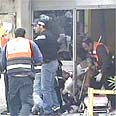
Scene of the bombing in Jerusalem, March 2002
צילום: ערוץ 2
Separate lives, one death
Story of teenage Palestinian suicide bomber and her teen Israeli victim inspired Italian novelist Gabriella Ambrosio to write 'Before We Say Goodbye', recently translated into Hebrew
The last seven hours in the lives of a teenage Palestinian suicide bomber and her victim, an Israeli teenage girl of the same age, stand at the heart of the novella "Before We Say Goodbye" ("Prima di lasciarsi") by Italian author Gabriella Ambrosio.
The book was recently translated from Italian into Hebrew and will be available on book shelves in Israel starting this week.
"Before We Say Goodbye" (Hebrew: "Lifney Hapreda", Pardes Publishing) is based on a true story of a blast at a supermarket in the Kiryat Yovel neighborhood in Jerusalem on March 29, 2002, which killed 17-year-old Racheli Levy and the security guard at the place, 55-year-old Haim Smadar. The suicide bomber was 17-year-old Ayat al-Akhras from the Deheishe refugee camp.
Following the bombing, newspapers in Israel published the photos of both al-Akhras and her victim, Levy, which revealed an astounding resemblance between the two young women.
Ambrosio says that reading about the bombing in the papers prompted her to delve into the story. "I noticed an item about the attack that focused on the two girls, who were referred to as sisters. I understood that this was an unusual story and I wanted to get to the grain of truth in it."
In her book Ambrosio manages to convey, in a reliable and unsettling manner, the complex realities of the Israeli-Palestinian conflict, and the daily lives of people on both sides in the midst of the intifada and terror attacks.
She describes the experience of exile and occupation which pushed the Palestinian girl to seek revenge against Israelis, and the memory of the Holocaust and yearning for security that are an essential part of the Israeli girl's identity.
'A humanistic message'
The Italian author wrote the book after conducting a research in Israel and meeting with Alharas' father and Levy's mother. Ambrosio said that it was emotionally difficult for her to write it.What message did you wish the story to convey?
"This is a novel. I'd like the reader to ask himself what the value of life is, how to face such situations, to make him face the dilemmas I have had to face. I want to get the reader to think. This book doesn't carry a political message, but rather a humanistic one."
First published in Italy in 2004, the book was warmly welcomed by readers and critics and was integrated into the high school curriculum in the country. It is now also being taught in universities in France and Australia. Since its publication, Ambrosio has been travelling the world as an "ambassador of peace", and she regularly meets with high school and university students to discuss the Israeli-Palestinian conflict.
The book is also set to be published in Arabic and distributed in the Palestinian Authority and Jordan. It has been recommended as an educational tool by the Palestinian education minister and human rights organization Amnesty. Which contributed to its publication in Arabic, also believes that it could also serve the struggle for human rights in the Middle East.










